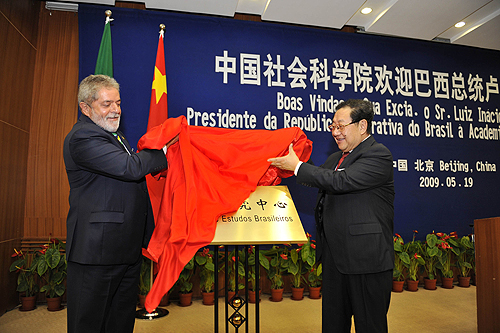|
 |
|
INAUGURATION: Visiting Brazilian President Luiz Inacio Lula da Silva and President of the Chinese Academy of Social Sciences Chen Kuiyuan open a Brazilian studies center at the Chinese Academy of Social Sciences based in Beijing on May 19 (CNSPHOTO) |
Beijing Review: During President Lula's visit to China, China and Brazil decided to devise a joint action plan for 2010-2014. What is the significance of the action plan?
Clodoaldo Hugueney: This is one of the major results of President Lula's  visit to China. Our relations have been growing at a very fast pace for many years. Economic relations are extremely important for both countries. China is now the largest trading partner of Brazil. Cultural relations are increasing. Political relations are also very important. Between the second half of 2008 and the end of 2009, President Lula and President Hu Jintao will have met nine times. We also have an intense dialogue in international fora at the UN and WTO and on climate change. We are members of the BRIC [Brazil, Russia, India and China]. We are emerging economies. We have a real strategic dialogue. We have reached such a point in our bilateral relations that we need to give these relations a real strategic dimension in terms of a long-term program, trying to encompass all areas of the relationship, political, multilateral, economic, trade, investment, cultural and people-to-people. That's the objective of the joint action plan. visit to China. Our relations have been growing at a very fast pace for many years. Economic relations are extremely important for both countries. China is now the largest trading partner of Brazil. Cultural relations are increasing. Political relations are also very important. Between the second half of 2008 and the end of 2009, President Lula and President Hu Jintao will have met nine times. We also have an intense dialogue in international fora at the UN and WTO and on climate change. We are members of the BRIC [Brazil, Russia, India and China]. We are emerging economies. We have a real strategic dialogue. We have reached such a point in our bilateral relations that we need to give these relations a real strategic dimension in terms of a long-term program, trying to encompass all areas of the relationship, political, multilateral, economic, trade, investment, cultural and people-to-people. That's the objective of the joint action plan.
The joint action plan was proposed in a letter from President Lula to President Hu Jintao in December last year. President Hu Jintao replied to this letter and accepted President Lula's proposal. The joint communiqué signed by both presidents supports the idea of the joint action plan and says that the joint action plan will be adopted at the second high-level commission meeting during Brazil in the second half of this year.
The joint action plan will involve measures in all areas of our relations as well as new areas for cooperation in this five-year period. It will also introduce mechanisms for evaluation of and permanent follow-up on the development of bilateral relations during this period.
What do you think the two countries should do to diversify their trade mix and promote trade growth?
As a matter of fact, the growth in trade between Brazil and China has been extraordinary for the past 10 years. It reached a growth rate of 70 percent last year and if you take a five-year average, it grew by around 50 percent every year. We think, however, that in spite of this extraordinary growth, there is still enormous potential for growth in trade between Brazil and China. Of course, this year is not a typical year because we are witnessing a significant decrease in world trade overall. It is important to note that, at a time when our exports to practically all regions are decreasing, the only area to which our exports are increasing is Asia and basically, in China. That's the only area in the first four months of this year to which our exports grew.
What are the problems? First, we have to maintain this momentum and overcome difficulties in 2009. The fact that trade between the two countries is still growing represents the stimulus for both economies to resume growth. As a matter of fact, neither China nor Brazil will go into recession. Both countries will come out of this crisis stronger. Second, Chinese exports to Brazil are very much diversified. China exports all sorts of manufactured goods to Brazil. Brazilian exports to China have been concentrated on primary commodities-agricultural goods like soybeans, tobacco, coffee and cotton. Other important commodities are iron ore and oil. What we need to do is to diversify our exports to China and export more manufactured goods to China.
In July 2008, Brazil launched a China Agenda to boost bilateral trade and encourage Chinese investment in Brazil. What measures have been taken under this program and what progress has been made?
The agenda is a document that contains an evaluation of the trade between Brazil and China and a series of proposals. Many of the proposals are about diversifying Brazil's exports to China so that the trade becomes more balanced and we have stronger two-way trade growth that benefits all sectors of the economy in both countries. The sector of the Brazilian economy that currently benefits most is the mineral and agricultural sector. The industrial sector does not benefit much from trade with China. That's why we have to diversify. To do that, part of it needs to be done by Brazil. We are going to intensify our presence at exhibitions and fairs in China. We are going to have a strong presence next year at Expo 2010 in Shanghai. President Lula brought with him more than 200 Brazilian businessmen to China. During his visit, we had two major events, one in Shanghai and one in Beijing, to promote Brazilian industry and better knowledge of the Brazilian economy. We also think China can do its part. Brazil has suggested that China organize a mission of Chinese businessmen to Brazil to buy more manufactured goods in the second half of this year.
There are discussions in China and Brazil about using the yuan and the real instead of the U.S. dollar in bilateral trade. What's your take on this?
This is an important proposal. President Lula raised it to President Hu Jintao when they met in London on the margins of the G20 meeting. He again raised this issue in Beijing in the working meeting they had. This is something that is more easily done when countries are neighboring countries. In the case of Brazil and China, it is more complex.
| 